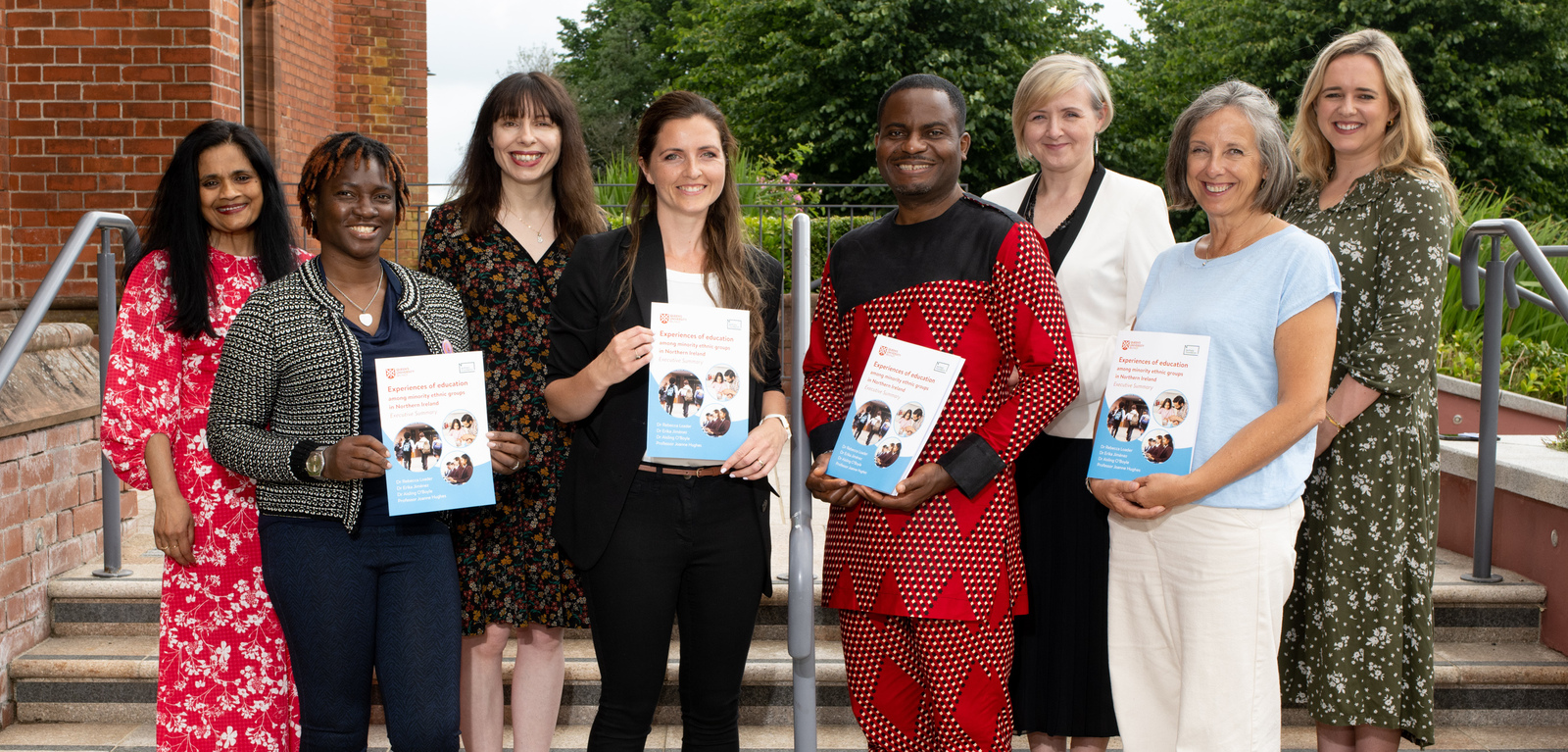Children from newcomer, refugee and asylum-seeking backgrounds prolonged wait for school places
A research report launched today (Tuesday 20 June) has found that newcomer pupils and children from refugee and asylum-seeking backgrounds often experience a protracted wait for school places in NI due to shortages in areas of high demand.

According to the report, while most schools are accommodating, there were accounts of some schools being reluctant to admit newcomer pupils even when places were available.
The research report, ‘Experiences of Education Among Minority Ethnic Groups in Northern Ireland’ examined the school experiences among minority ethnic and migrant families and was carried out by a team of experts from the School of Social Sciences, Education and Social Work at Queen’s including Principal Investigator Dr Rebecca Loader; Dr Erika Jiménez; Dr Aisling O’Boyle; and Professor Joanne Hughes.
The research focused on four main topics: school admissions and transfer; school life and peer relationships; curriculum issues including representation of diversity and English language learning; and home-school relationships.
Key findings include:
- Navigating the complex NI education system is challenging for migrant parents, especially those with lower levels of English language fluency. Applications processes can also be difficult for those with lower literacy levels and less confidence with online technologies.
- The proximity of the school to home and the diversity of intake are important factors in parents’ school choice. While a school’s denomination is not a priority for many families, some parents from minority faith traditions are concerned about how to support their child at a school with a Christian ethos.
- The transfer test for grammar school admissions presents a particular challenge for migrant families, particularly those arriving in NI the upper years of primary school. Some migrant parents felt that their children had been disadvantaged in admissions decisions.
- Some parents spoke about the risk of special educational needs (SEN) being missed among children with English as an additional language or the difficulty of having concerns or diagnoses recognised by the school. There were indications families could experience additional challenges in accessing support for SEN.
- Experiences of verbal and physical racist bullying, as well as direct and indirect discrimination, are widely reported by families. While racist bullying negatively impacts children’s mental health, wellbeing and school attitudes, racist incidents are often inadequately addressed by schools.
- Children and parents largely have positive views on learning and sharing about cultural and religious diversity at school, but some identify a need for greater representation of diversity in the curriculum, particularly in subjects such as history and religious education.
Speaking about the importance of the research findings, Dr Loader from Queen’s said: “The composition of Northern Ireland’s pupil intake has changed over the past 20 years with 6.1 per cent of pupils now from a minority ethnic background, and 5.5 per cent are newcomer pupils. Providing an equitable educational experience for minority ethnic and migrant children and their families is a legal and social obligation, but there has been little previous research examining to what extent policy and practice are serving their needs.
“Questions about the future shape of educational provision in Northern Ireland are also high priority at the moment given the ongoing Independent Review of Education, while more specific questions about the content of the curriculum have come to the fore in recent years and require further consideration to ensure the inclusion of diverse histories, literatures and cultures.”
Other key findings showed that the quality of language support for newcomer children is variable and is perceived to be dominated by an ‘emergency response’. Classroom assistants, both bilingual and others, often become the principal English language teachers for newcomer pupils.
Most parents feel comfortable contacting their child’s school with concerns or questions. However, some experience barriers including a lack of confidence about communicating in English, anxieties about seeming ‘difficult’ or working patterns. Practices that schools had successfully adopted to overcome barriers to parents’ engagement included conducting home visits and employing family support staff.
Commenting on the report, Education Programme Head Ruth Maisey from the Nuffield Foundation said: "Timely allocation of school places is essential for newcomer children's educational and social development, and for the well-being of the whole family. It is also vital that children’s schooling isn’t disrupted when asylum-seeking and refugee families are rehoused, to minimise impact on their learning."
Alfred Abolarin, Chair of the Migrant and Minority Ethnic Council (MME) Think Tank commented: “This report is an important body of work which will contribute to closing some of the gaps in our knowledge in an under-researched area. It will be of great value and significance to teachers and education professionals, to parents, and to policy makers as they respond to a rapidly changing ethnically diverse landscape, and will contribute to enabling us get to a place where all our children, whatever their background, will be able to reach their full potential.”
The research project took place between September 2021 and June 2023 and was funded by the Nuffield Foundation.
For the full report, please visit: https://www.qub.ac.uk/Research/ethnic-minorities-ni/research/ExperiencesofeducationamongminorityethnicgroupsinNorthernIreland.html
Media
Media enquiries to Zara McBrearty at Queen’s Communications Office on email: z.mcbrearty@qub.ac.uk